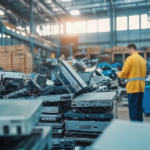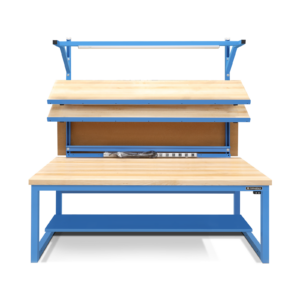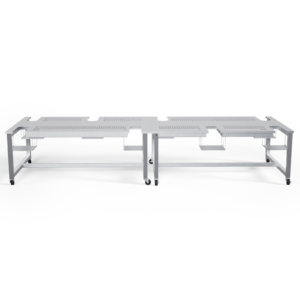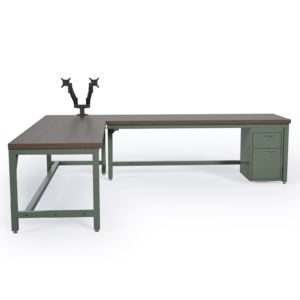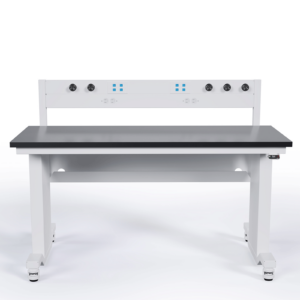In last week’s article, we looked at how Amazon organizes and operates its fulfillment warehouses. This week, let’s take a look at Amazon’s aggressive sales strategy.
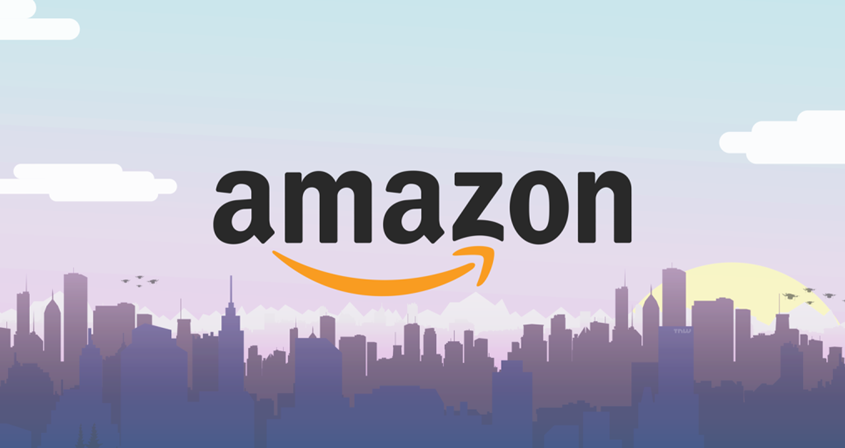
Amazon’s Three Part Strategy: Customer Personalization, Speed of Delivery, and Network Effects
Amazon knows a lot about you. Even if you have never visit Amazon.com, it’s likely you have visited websites with an Amazon affiliation. Perhaps you have visited Audible.com (audio books), Goodreads.com (book recommendations), Woot.com (flash discount sales), Bookfinder.com, Zappos.com (shoes), the Internet Movie Database (IMDb.com) or Pets.com and didn’t realize they were Amazon subsidiaries. Or maybe you visited the website of a public radio or television station or other local website which encourages you to click on their Amazon badge (when making your Amazon purchases) so that the web site receives a small commission. As you might guess, not only does this network of subsidiaries and affiliates help Amazon expand its web reach, it also helps Amazon track your web browsing patterns.
Amazon’s Customer Personalization Strategy: Maintain a Detailed Dossier on Your Purchases, Interests and Tastes
One obvious reason Amazon wants to track your behavior is so it can make personal recommendations to you — based on a sophisticated internal model they have developed using your personal data. Personalization is very effective. It’s really part of today’s Business-to-Consumer (B2C) zeitgeit — comparable to the way Facebook encourages you to “like” business products and services.
Many sociological studies (such as this on encouraging recycling) indicate that A) recommendations made by friends or role models or B) awareness that others (such as your neighbors) are “doing something” is a far stronger behavior influencer than just providing basic information, such as listing reasons why you should do something. That’s why Amazon also includes information such as “others who looked at this product also looked at A, B and C” or “persons who bought this product also purchased X, Y and Z” in their search results.
Efficiency Effects of Customer Personalization on the Supply Chain
Customer Personalization’s role is not limited to the customer-facing sales side of the business. There is also an important operational back-end component. The more that a retailer such as Amazon knows about your interests and purchasing habits, the better they can predict what you will purchase, when you will purchase and in what quantities. This in turn smooths out their supply chain, by making sales predictions more predictable and reliable. In fact, you may be aware that Amazon encourages you to place regular automated orders for staple goods, such as paper towels or toilet paper, or razor blades and organic rice. They even offer discounts if you agree to make these regular automatic purchases.
It’s just one more way you are locked in as a customer, but it’s more than that: it allows Amazon to to know well in advance when they need to stock and ship something to you. It’s also been widely reported that Amazon plans to take this approach one step further. They have announced they will begin pre-stocking items that their “big data” sales model indicates you will purchase in the near future — even before you place your order. By pre-stocking items you haven’t yet ordered, Amazon is betting that it can reduce the time required for delivery. And that brings us to the second part of the Amazon strategy: Delivery Speed.
In Search of the Holy Grail: Amazon Same Day Delivery
It’s tempting to compare Amazon and its out-sized role in the marketplace with the Sears Roebuck and Co. catalog of decades past. Like Amazon today, the Sears Roebuck catalog, in its time, offered a bewildering array of products direct to consumers, at prices which nearly always beat the local retail outlets. Back in the day when ordering goods through the mail took days (if not weeks), the competition between a local retail outlet and the catalog company was pretty clear. If you needed the product today, you had no choice but to buy from a local retailer. However, as Amazon introduced next day delivery (and free two day delivery for its premium Prime membership customers) the competitive pressure on local retailers has increased.
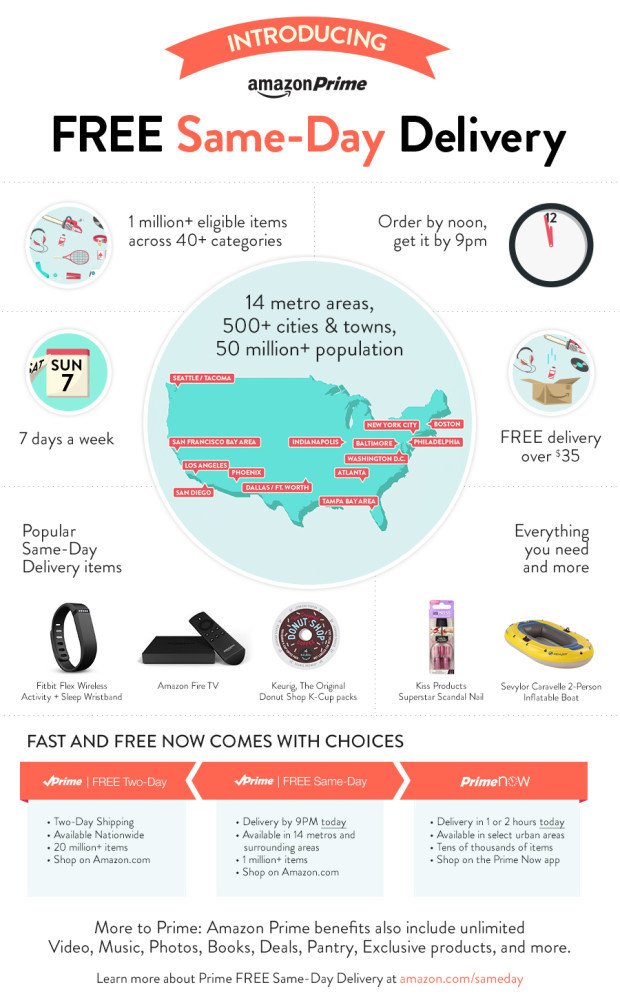
Saving Time Comes in Different Forms: The Brick and Mortar Omni-Channel Fights Back
Today, a customer’s motivation to order online often comes down to avoiding a wasted trip to the store for an item that may or may not be in stock. In response to competition from Amazon, many brick-and-mortar stores have realized that they need to respond by creating an omni-channel so that customers can order online and pick up their items at their local store. Thanks to big IT investments, you can log into Walmart.com, Lowes.com or HomeDepot.com today and instantly check whether an item you want is in stock at your local store.
If it is, in many cases, you can often order it and pick it up at the front desk on the same day (within 20 minutes at Lowes). Checkmate Amazon. Clearly, Amazon’s goal is to meet this challenge by providing same-day direct delivery in major markets. In the meantime, Amazon continues to aggressively pursue any advantage it can find over local retailers. You say your local retailer is closed on the Sunday before Christmas? No problem. At certain times of the year, Amazon will deliver on a Sunday, thanks to a partnership with the cash-strapped U.S. Postal Service.
Drone Deliveries: Afghanistan Today, Anaheim Tomorrow?
And no doubt you caught wind of Amazon’s proposal to deliver products direct to residential addresses via unmanned aircraft drones. Some viewed this as a publicity stunt — and if it was it was very successful. However, the U.S. Marines have used drones to deliver supplies to troops within Afghanistan. So the concept is viable, if not a little bit creepy. A short advertisement here for Formaspace: if drones do start making regular deliveries, we’d like to remind you that our industrial-strength workbenches and tables are strong enough to handle any drone landings!
We have proof. Our President, Jeff Turk, who is a avid helicopter pilot, landed a full-size helicopter on some of our workbenches here at our furniture factory in Austin, Texas. These strong, made-in-America workbenches are up to any task you can throw at them, and they are guaranteed for 12 years of continuous use. And let’s not forget, we can customize any of our wide range of technical furniture products to your exact personal requirements and delivery them to you quickly. Just give us a call at 1800-251-1505 and we’ll take care of you.
Next week we’ll take a look at the ways Amazon has expanded its Network Effect (through electronic sales, multi-channel marketing, drop shipping and network cloud services like AWS) and what upstart newcomers like Zulily are doing to take them on.



